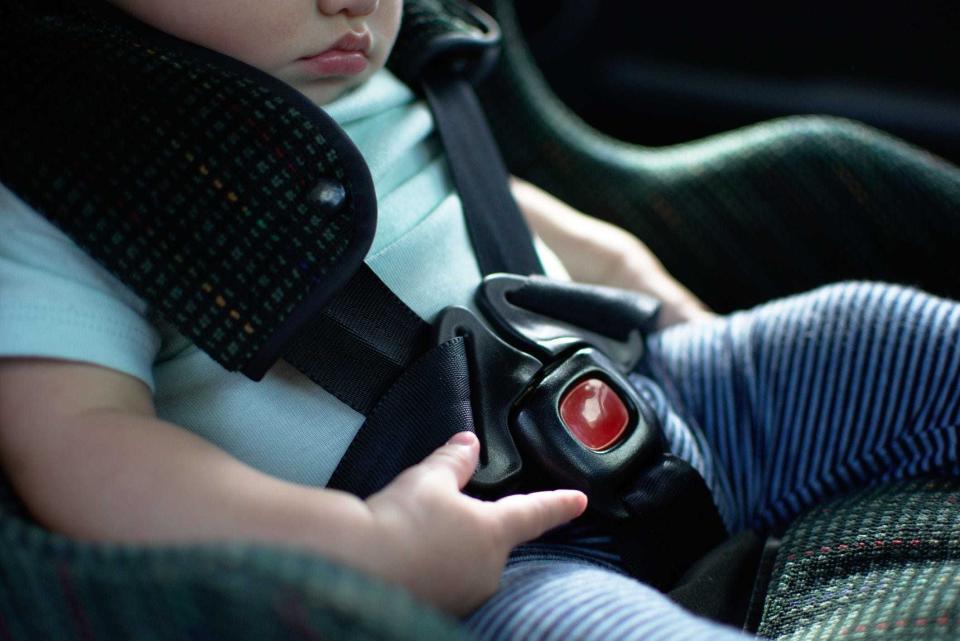National Child Passenger Safety Week: Car seat, booster seat, seat belt info for Florida
Car crashes are a leading cause of death for children, according to the Florida Department of Transportation, and the agency presents two important facts:
85 children (under 13) were killed in passenger vehicles in 2022.
Almost 50% of those children were unrestrained.
This week is National Child Passenger Safety Week, started to bring awareness to safety belts and child safety, and it ends in National Seat Check Saturday. There may be free car seat installation and education programs available near you on Saturday, such as this one in Pompano Beach.
Here's what you need to know to keep your children safe.
Does Florida law require car seats for children?

Florida law requires the use of seat belts or child restraint devices by drivers of motor vehicles, all front seat passengers, and all children riding in a vehicle under 18.
Children aged 3 and younger must be secured properly in a crash-tested, federally approved child restraint device, either a separate carrier or a vehicle manufacturer's integrated child seat.
Children aged 4 through 5, regardless of size, must be secured in a separate carrier, integrated child seat or booster seat.
What's the best child car seat?
"The best seat is the one that fits your child’s size, is correctly installed, fits well in your car, and is used properly every time you drive," the FDOT said.
Be sure to read the seat's instruction manual to make sure you are using it properly, and check for recalls at nhtsa.gov/recalls.
What types of child restraints and car seats are there?
According to the Florida Department of Transportation:
Rear-Facing Car Seat: A rear-facing car seat is the best seat for a child under age 2, and infant-only seats can only be used rear-facing. Convertible and 3-in-1 car seats typically have higher height and weight limits for the rear-facing position to keep a child rear-facing for a longer period of time. If the vehicle does not have a backseat, the rear-facing car seat should be used with the airbag turned off.
Forward-Facing Car Seat: A child should remain in a rear-facing car seat until he or she reaches the top height or weight limit allowed by the car seat’s manufacturer. Keep a child rear-facing as long as possible, usually until age 2 or 3. If the vehicle does not have a backseat, the forward-facing car seat should be used with the airbag turned off.
Booster Seat: In Florida, children ages 4 through 5 must be in a separate carrier, integrated child seat, or booster seat. Once a child outgrows a forward-facing car seat, children can travel in a booster seat, always in the back seat. If a vehicle does not have a backseat, the booster seat should be used with the airbag turned off.
Seat Belt: A child should remain in a booster seat until he or she is big enough to fit in a seat belt properly. For a seat belt to fit properly, the lap belt must lie snugly across the upper thighs, not the stomach. The shoulder belt should lie snug across the shoulder and chest and not cross the neck or face.
The National Highway Traffic Safety Administration has a breakdown of each type, with general instructions on installation and use, and a Car Seat Finder that lets you compare seats based on your child's age, weight and height.
Where can I get my car seat checked for safety?
You can get your child's child seat checked at many locations across the state, including sheriff's offices, fire departments, health departments, car dealerships and other places. You can search for one near you at NHTSA.gov, or check the city and county lists at floridaoprc.ce.ufl.edu/oprc/Fitting_Stations.asp
This article originally appeared on The Daytona Beach News-Journal: National Seat Check Saturday: Car seat types, installation, inspections

